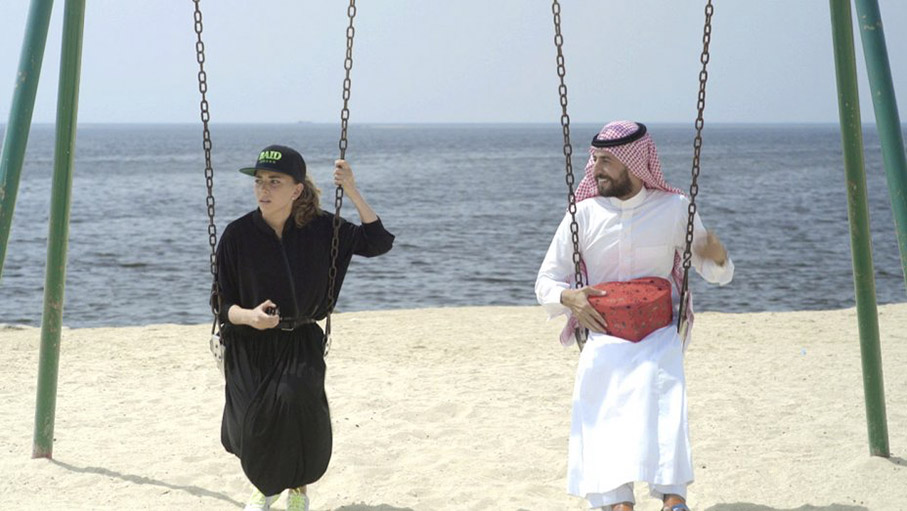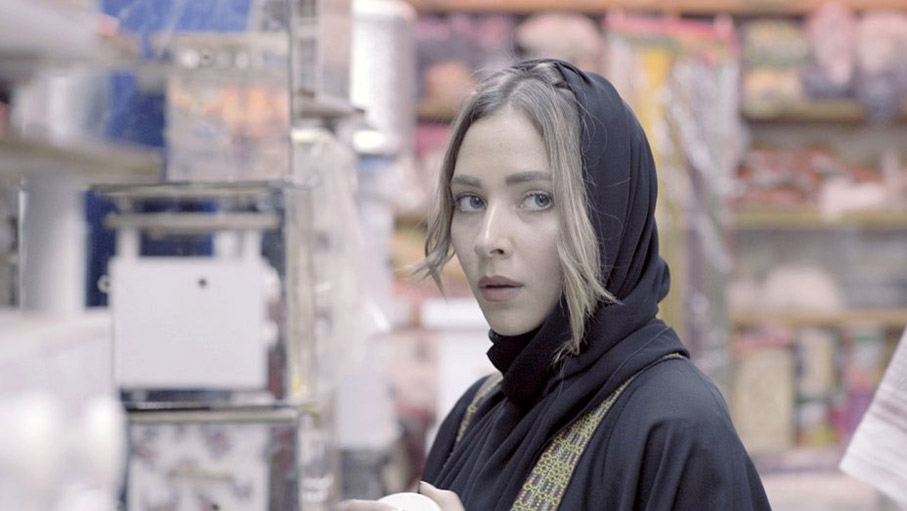|
In her haunting essay film For Cultural Purposes Only (2009), Sarah Wood explores the fate of the Palestinian Film Archive, a painstakingly assembled collection of over 100 films that tragically 'disappeared' during Israel's siege of Beirut in 1982. What, Wood asks, must it feel like to live in an image-saturated era and see no images of your native land? It would be instructive to ask Saudi Arabians for they have no archive to mourn, no film industry to speak of, and no commercial cinemas to attend. Since 1979, their country has, effectively, been a cinematic desert.
Three years before the siege of Beirut, a siege at the Great Mosque in Mecca had ended in the execution of the millenarian fundamentalists who had repudiated Westernisation and challenged the authority of the Saudi royal family. It resulted in cinematic carnage too after the authorities capitulated to hardline puritan demands. According to one of his nieces, the autocratic monarch of the day, King Khaled, concluded that the 'the solution to religious upheaval was simple . . . more religion.' In the repression that followed the Grand Mosque incident, censorship and surveillance increased, gender segregation intensified, the religious police (the muttawa) became more aggressive, and cinemas were shut down. The after effects of the siege resonate in Saudi society to this day.

Given that history, or lack of it, it is unsurprising that Haifaa Al Mansour's debut feature Wadjda created a considerable stir when it screened at the 56th London Film Festival in 2012. It was the first feature shot entirely in Saudi Arabia and the first Saudi film to screen at the festival. Even more remarkably, both its director and eponymous heroine were female. A heartfelt comedy about a girl who enters a Quaran recital competition to secure the cash for the bicycle she craves, it was promoted in the festival programme as 'offering audiences a rare glimpse into everyday Saudi society.'
This year, Mahmoud Sabbagh's debut Barakah Meets Barakah, another light-hearted, heartwarming Saudi comedy graces the London Film Festival. Billed as 'an insider's glimpse into a still relatively cloistered society', it was shot in Jeddah on a shoestring by a group of friends who had previously studied in the United States together. This expertly acted, always charming, often richly inventive film recounts the halting romance between Barakah (Kisham Fageeh), a working-class municipal inspector, and Bibi (Fatima Al Banawi), a middle-class orphan, fashionista and Instagram celebrity. Barakah instantly falls for Bibi after happening upon a waterfront fashion shoot on his rounds. Mutual attraction develops after they bump into one another again at an art gallery preview but their hesitant relationship is thwarted at every turn by Bibi's controlling adoptive mother, stymied by the religious police, and checked by Barakah's inexperience in affairs of the heart.
The couple's Romeo and Juliet affair is played out against the backdrop of rehearsals for an amateur performance of Hamlet, in which the hirsute Barakah is improbably allocated the role of Ophelia. If that subsidiary casting decision hints at the rather obvious slapstick on offer here, the film also insinuates that something is rotten in the state of Denmark. Its funniest moments revolve around Barakah's raffish dopehead uncle Da'ash (Sami Hifny) and his outspoken midwife auntie Sa'adiya (Khairia Nazmi) – a bickering odd couple who offer advice that does nothing to advance Barakah's cause and who emphasize the generational and class conflicts that are subtly teased out throughout the film.

This lightly amusing, tender and touching fable insinuates much about Saudi society without being openly didactic. It shows how it stifles young women and details the difficulties couples encounter in an illiberal patriarchal society that forecloses freedom of contact beyond the confines of marriage. Censorship is also alluded to in a series of pixelated moments smuggled in beneath cover of an ironic opening disclaimer. Most strikingly, the Saudi of the 1960s is contrasted unfavourably with the more repressive Saudi of today in two elegantly executed, exquisitely lyrical sequences that place the subversive undertones which underpin the film centre stage.
In the first of those interludes, Barkah addresses a comatose elderly relative as archive images, including one of the Grand Mosque siege, play out on screen. Concluding his meditation of what happiness in public places looked like then, he says: 'Your generation lived life to its fullest but then you got scared as you aged. You made it but you didn't defend our generation's rights.' It is a theme that recurs in the second memorial sequence and is compacted in the film's keynote line: 'Our whole generation lives in a loop and we can't break out of it.' This engagingly upbeat film's downbeat ending might suggest that will remain the case but the mere fact of the film's existence suggests otherwise.
Both Mahmoud Sabbagh and Kisham Fageeh seemed ebulliently optimistic when we discussed it with them. Both expressed high hopes that Saudi film can play its part in eroding entrenched attitudes. Both shrugged, though, when I suggested they might live to see cinemas all across their vast homeland. Mahmoud Sabbagh talked nostalgically of the days of clandestine screenings, the days of 'cinemas in yards'. In Abdullah Al-Eyaf's 2006 Saudi short Cinema 500 km an ardent cinephile flies to Bahrain to fulfil his dream of seeing a film in a cinema for the first time. When I lived in Saudi Arabia as a lad I used to watch films in cinemas regularly – within gated expat communities. I'll never forget watching a Hollywood weepie on the Aramco compound: I forget the film but still remember the tears streaming down the face of a Saudi girl I knew. She said she'd never seen anything like it before. Perhaps she'd never seen a film before. The internet and TV mean Saudis aren't starved of images but, come on, it's not the same, is it? Hurrah for darkened rooms and here's to Saudi Arabia as a land of cinema and cinemas. Where there's light there's hope.
Barakah Meets Barakah screened at the 60th BFI London Film Festival on the following dates:
Saturday 08 October 2016 20:30
Cine Lumiere
Thursday 06 October 2016 18:30
Curzon Soho Cinema, Screen 1
The 60th BFI London Film Festival runs from 5th to 16th October 2016.
For further information on the films being screened and to buy tickets for showings, head here:
https://whatson.bfi.org.uk/lff/Online/
|